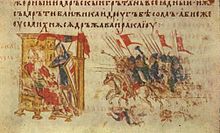Phocas
Initially a middle-ranking officer in the Eastern Roman army, Phocas rose to prominence as a spokesman for dissatisfied soldiers in their disputes with the court of the Emperor Maurice.
The revolt proved to be successful and led to the capture of Constantinople and the overthrow of Maurice on 23 November 602, with Phocas declaring himself emperor the same day.
Avars and Slavs renewed their destructive raids on the Balkans, and the Sasanian Empire launched a massive invasion of the eastern provinces.
He is described as an incompetent tyrant and usurper who brutally purged any real or perceived opposition and left the Empire wide open to foreign aggression.
The veracity of these sources is difficult to ascertain since emperors of the Heraclian dynasty who succeeded Phocas had a vested interest in tarnishing his reputation.
The life of Phocas before his usurpation of the Byzantine Empire's throne is obscure, but he was said to have served as a centurion in the army in Thrace under Emperor Maurice.
As Phocas presented their case, he argued with the emperor, and as a result, had his beard pulled by an outraged person of patrician rank.
[8] In autumn 602, the Thracian army rebelled against Maurice, largely due to exhaustion and outrage over orders to continue campaigning north of the Danube in winter, as well as previous cuts in wages.
That night, on 22 November 602, Maurice and his family fled on a warship to Bithynia, sending Theodosius on a mission to ask for Persian King Khusrow II's help.
According to Theophylact Simocatta (c. 630), Germanus initially made an attempt for the throne, but when rebuffed by the Green circus faction, he paid homage to Phocas, who had emerged as the heavy favorite.
[13][14][page needed] Despite the executions of the previous emperor and his dynastic successors, Phocas remained in a precarious position, which led him to devote his energy to purging enemies and destroying conspiracies.
[15] The Sassanids rapidly occupied the eastern provinces, leading the Magister militum per Orientem, Narses, to defect to their side.
The 'miracle of St Demetrios' described the carnage: [T]he devil raised the whirlwind of hatred in all the East, Cilicia, Asia, Palestine and all the lands from there to Constantinople: the factions, no longer content simply to spill blood in public places, attacked homes, slaughtered women, children, the aged, and the young who were sick; those whose youth and frailty impeded their escape from the massacre, [saw] their friends, acquaintances, and parents pillaged, and after all that, even set on fire so that the most wretched inhabitant was not able to escape.
[17] Due to his distrust of the bulk of Constantinople's elite, with whom he had had no connection before becoming emperor, frequently filling senior military positions with his relatives.
Gregory referred to him as a pious and clement lord, and compared his wife (the new Empress) Leontia to Marcian's consort Pulcheria (whom the Council of Chalcedon called the new Helena).
[19] Heraclius the Elder agreed, and began to prepare to invade, by cutting off the supply of grain to Constantinople and assembling a large army and navy.



